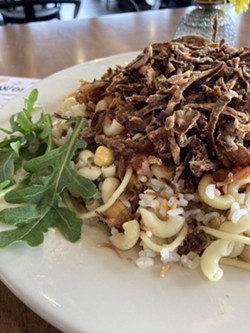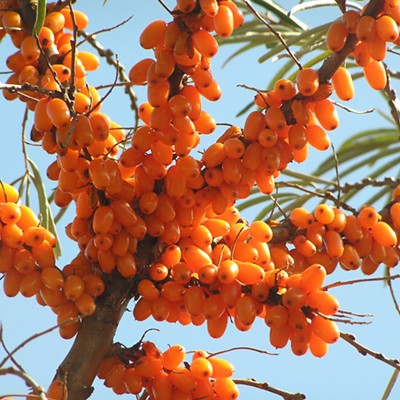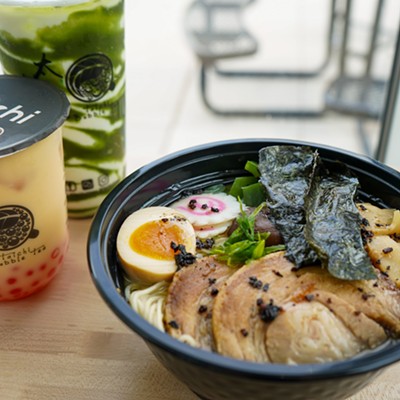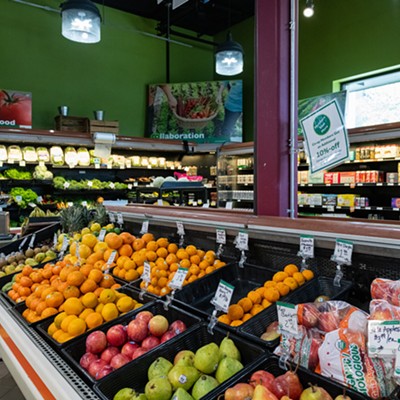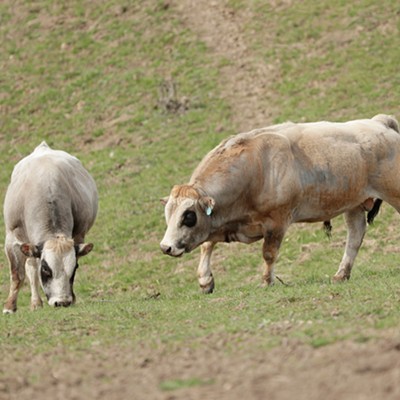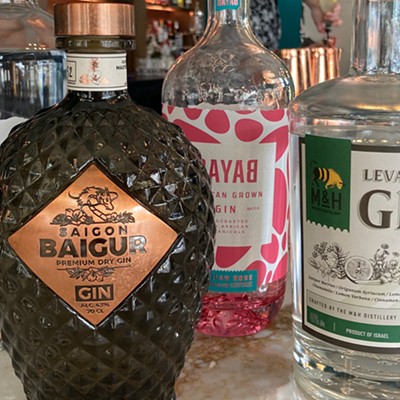
This is an installment of the Inlander's yearlong project "Around the World in 80 Plates," a quest to find 80 foods and drinks in the Spokane area representing 80 different places. Read the introduction to the project here.
Count of dishes/places: 31
I am about to describe a plate of food as a national dish, even though I'm aware that there isn't really such a thing. There's no global body that designates national dishes. There usually aren't organizations within a country deciding its citizen's favorite food. There isn't a ballot option to vote for a presiding U.S. dish.
Though it might seem ridiculous to conflate politics and dinner, it's not actually that silly a premise.
"Gastronationalism" is a term coined in 2010 by North Carolina State associate professor Michaela DeSoucey . It describes how food can be used to instill or increase national identity within citizens. She's not alone in noticing this. In her book National Dish: Around the World in Search of Food, History, and the Meaning of Home, author Anya von Bremzen examined poignant examples of the politicization of food, like if Ukrainians can claim borsch, if Margherita pizza belongs only to Naples, and if ramen is a Japanese invention or the result of post-WWII American occupation.
Spoiler alert: Von Bremzen ruins a lot of the mythology around the world's most famous foods. She eventually comes to the conclusion that authenticity is basically "a monster marketing tool."
So anytime you hear some kind of food described as a national dish, take it with a grain of salt.
Yes, that even includes the next few paragraphs.
KUSHARI FROM EGYPT
When chef Samah prepares her menu of Egyptian food for Feast World Kitchen, she likes to mix it up. But one thing she always has to include? Kushari.
"I have special customers who always request it," she says.
Kushari is listed on popular websites as Egypt's national dish. But it isn't elegant, elite, or especially difficult to make. If kushari is Egypt's national dish, it's because of its ubiquity. It's something cheap that will keep laborers full all day even if it's their only meal, the Egyptian chef says.
She's not wrong. Kushari is a stampede of starch, a cacophony of carbs, that sticks to your insides all day. Not to mention Samah's portions are so large it took me three days to finish it all. But that means I got three meals for $15, so I'm definitely not complaining.
Kushari is a delightful, disorderly mix of rice, macaroni, thin and thick spaghetti noodles, lentils and chickpeas, usually topped with a heap of caramelized onions and drenched in a tomato garlic sauce. For an extra crunch, Samah decided to try frying the onions this time around (two thumbs way up from me). In a valiant effort to offset the mound of browns, four small sprigs of arugula gave the plate some much needed color.
Kushari tastes wonderful, if only because tomato and garlic on carbs always tastes wonderful. The noods, beans and rice are chewy, the onions are crunchy, and the whole thing is warm and savory. It's a hug on a spoon. It's also technically vegan, even though fitting trendy diets isn't the goal — it's just what happens to be cheapest and therefore most affordable for people in Egypt, Samah says. According to the World Bank, over 72 million Egyptians lived on $6.85 or less per day in 2019.
Kushari is a staple most Egyptians, and therefore divisive, too. Vendors on the street compete for customers, and every person has strict criteria for what it should taste like. But for the Egyptians in Spokane, Samah's kushari is legit. It should not be messed with. And it should always be on the menu.
So, next month when it's Samah's turn to cook for Feast again, you can be sure kushari will be front and center, regardless of if it's the official "national dish" or not.
BASBOUSA FROM THE ABBASID CALIPHATE
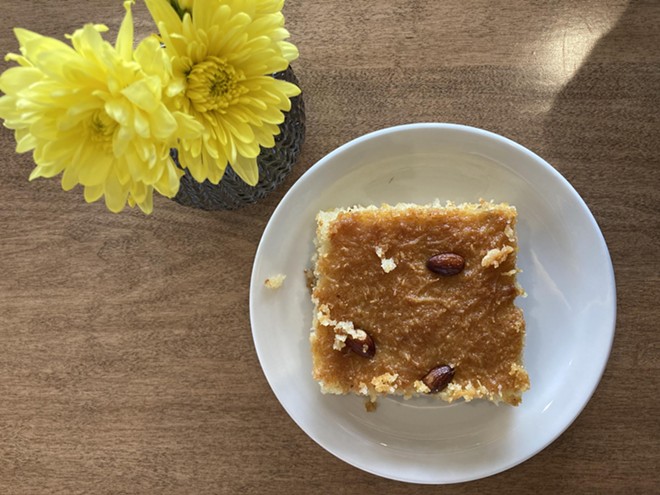
A common origin story for basbousa is that it's an Egyptian take on revani, a dessert that Ottoman chefs supposedly whipped up when their empire captured Yerevan, the capital of Armenia. If that doesn't smack of nationalistic propaganda, I don't know what does.
The Oxford Companion to Food traces basbousa instead to ma'mounia, a sweet named after Caliph Ma'moun, a 10th century ruler during the Abbasid Caliphate that stretched from Egypt to Afghanistan. It's one explanation for why the same dessert shows up across the Middle East with different regional names, like harisseh in Palestine or namoura across the Levant, plus tishpishti in Greece and safra in Libya.
Wherever it originated, chef Samah's Egyptian basbousa is now in Spokane. It's a semolina cake drenched in a sweet, sticky syrup and decorated with a few roasted almonds. Semolina is a course flour somewhere between all-purpose flour and couscous. With its thick grain, the cake might be crumbly if it weren't for all the butter and sticky syrup, which makes it moist and melty instead. It's everything I crave in a dessert — a satisfying, dense texture oozing with sweet, sweet honey.
As I sit here drooling over my basbousa, I really hope I'm not reveling in a tribute to wars and empires. I think I'll stick with Von Bremzen on this one: the nationalistic mythology behind this dessert is just that — a myth.♦
Have an idea for what I should eat next? Wanna make me a traditional dish or national dessert from your hometown? Send 80 Plates tips and ideas to [email protected].

